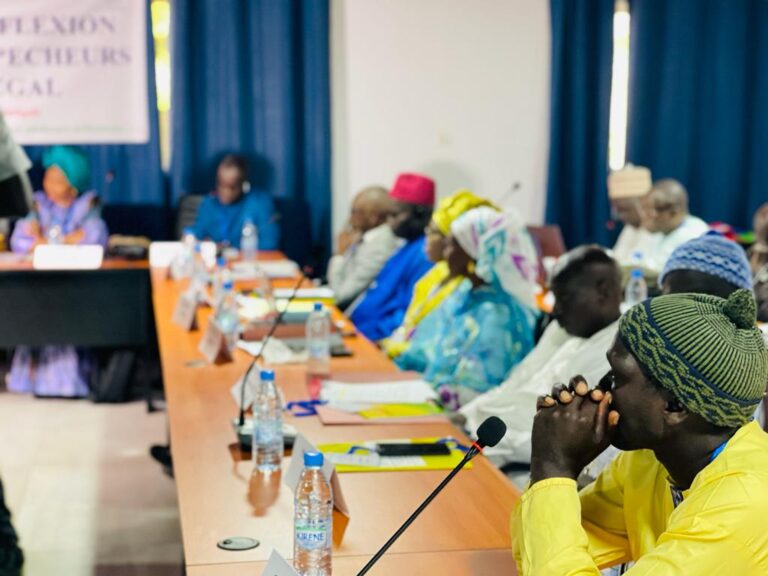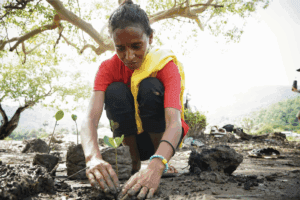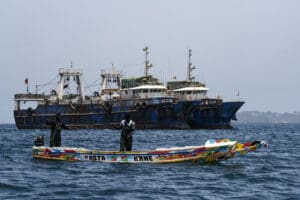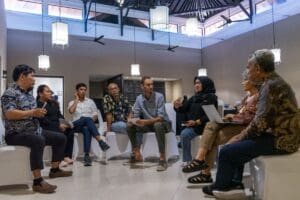As is the case with countries around the world, Senegal is facing a crisis of depleting fish stocks. Speak to any artisanal fisher in the country, and they will complain about the disappearing fish and the long, dangerous journeys they now have to make to find meagre catches. The disappearing fish come as a shock to many Senegalese: historically, Senegal has had incredibly rich fisheries, with its fish helping feed the nation’s rapidly growing population of nearly 17 million.
Fisheries represent an important part of the economy in Senegal, employing an estimated 600,000 people and providing a primary source of protein for almost the entire population of the country. But industrial overfishing and an overdeveloped artisanal fleet are threatening fish stocks, with rapidly plunging catches and rising market prices for fish making it unaffordable for many people. As fish disappear, conflicts increase between fishers as they compete to catch a dwindling resource.
Earlier this year, those competitions erupted into open violence that tragically led to one death and many wounded.
But sometimes, out of tragedy comes opportunity: after the burst of violence, communities agreed that something needed to be done. With the help of our Senegalese partners and the Ministry of Fisheries, Blue Ventures co-chaired a national workshop to address the tensions and find common solutions.
Origins of the conflict
In early April 2023, violent clashes broke out between fishers from different communities around Dakar. The conflict began when fishers from the Kayar Community-managed Marine Protected Area (CMPA) confiscated monofilament drift nets that had been set within the CMPA by seven pirogues (traditional Senegalese fishing boats) of fishers of the neighbouring Mboro area of Dakar, and burned the nets. Technically, monofilament nets are illegal in Senegal (although their use is widespread), and the use of monofilament drift nets is strictly prohibited inside the Kayar CMPA.
On the 2nd of April, the conflict between fishers from Kayar and Mboro broke into open violence, when a group of Mboro fishers attacked the Kayar fishers with petrol bombs, leading to the death of one young fisherman, and the hospitalisation with burn wounds of around twenty people, including women and children.
This level of violence had never been seen between fishers in Senegal before and shocked the nation. In the following days, the violence threatened to spin even further out of control, with thousands of fishers from the northern city of Saint Louis, located 300 kilometres north of Dakar, taking to the sea, threatening to join the fight in support of the Mboro fishers. An emergency intervention by the local authorities convinced the Saint Louis fishers to turn back, but by this stage, the entire Senegalese fishing community stood on the brink of open conflict.
In order to help defuse the crisis, Blue Ventures worked with the Association for the Development of Artisanal Fisheries (ADEPA) to organise an urgent roundtable, bringing together representatives from the different fishers communities and government representatives to seek to lower the tensions and prevent more conflict.
National Workshop of Reflection on the Conflicts Between Fishing Communities
At the roundtable, fisher representatives agreed to end the violence and to convene a national workshop to seek more permanent solutions to the conflicts.
Working with ADEPA, the Regional Partnership for the Conservation of Coastal and Marine Areas (PRCM), and the Ministry of Fisheries and Maritime Economy, Blue Ventures helped convene the National Workshop of Reflection on the Conflicts Between Fishing Communities in Senegal, which took place in Saly on the 15th and 16th of May.
The workshop brought together all the main actors involved in coastal fisheries in Senegal, including many representatives from the fishing communities themselves (represented by the Local Committees of Artisanal Fishers (CLPA)), representatives from the Ministry of Fisheries, religious officials, NGO officials, and academic experts. This was an unprecedented gathering to discuss the increasingly worrying state of coastal fisheries in Senegal.
Delegates agreed on a number of steps to resolve the conflicts between fisher communities in Senegal. These included a commitment by local fishers’ associations, the Ministry, and respected religious leaders to work together on educating and informing fishers about fishing regulations. Recommendations were made to improve enforcement mechanisms, including the proposed creation of a rapid intervention team and the establishment of a conflict resolution committee to help respond rapidly to emerging conflicts. The workshop also proposed greater involvement of fishers in the creation of legislation and rules and argued for more participatory and community-led surveillance mechanisms.
Towards better management of artisanal fisheries in Senegal?
The national workshop could present an important inflection point in artisanal fisheries management in Senegal.
At a Council of Ministers meeting in the aftermath of the clashes, the government explicitly stated its intention to resolve the conflicts among fishers, and several recent developments could lead to improved management of artisanal fisheries in the country.
In a progressive move towards reform of previously centrally managed fisheries administration, the government has declared almost the entire coastline of the country as CMPAs, giving communities a prominent role in working alongside the government to manage coastal fisheries. This role has also been acknowledged by the establishment of the CLPA, which is responsible for regulating and surveilling fisheries in their mandated areas. The first step to effective community management of marine resources is giving communities explicit legal rights – or “tenure” − to manage their resources, and this now exists in Senegal.
Equally important is the willingness of the Senegalese authorities, including the Ministry of Fisheries, to work with civil society, religious leaders, and artisanal fishers to find solutions to the crisis in fisheries. This commitment was clearly stated by the Minister himself at the national workshop and was repeated in follow-up meetings between Blue Ventures and the Director General of the Ministry a few weeks later.
With such a commitment to work together, we can find common solutions to the challenges we collectively face.
This commitment across sectors was illustrated in March 2023, when Ministry officials joined Parliamentarians and civil society partners in a three-day discussion convened by Blue Ventures and the Environmental Justice Foundation in Dakar focused on tackling threats posed by bottom trawling − a widespread and highly destructive industrial fishing gear.
Industrial Fishing Cannot Be Ignored
Of course, the Senegalese fishing sector faces an additional major threat from industrial overfishing by distant-water fleets from Asia and Europe. West Africa has been consistently defined as one of the global hotspots for industrial overfishing and illegal, unregulated, and unreported fishing (IUUF) by international experts. Intensive industrial bottom and pelagic trawling, driven by foreign demand for seafood, is threatening many fish stocks, including the small pelagic sardinella fish that are central to the food security of the region. Artisanal fishers often lose their gear to industrial vessels and compete for the same fish stocks.
The situation is further exacerbated by an explosive growth in fish meal factories in Senegal, The Gambia, and Mauritania, which turn what was once a crucial source of protein for West Africans into fish meal which is exported to Asia and Europe for feed for aquaculture – a massive disappearance of protein from West Africa. Fish meal factories also pollute the environment – the fishers of Kayar are currently taking legal action against a local fish meal factory after water tests showed high levels of pollutants released by the factory.




















